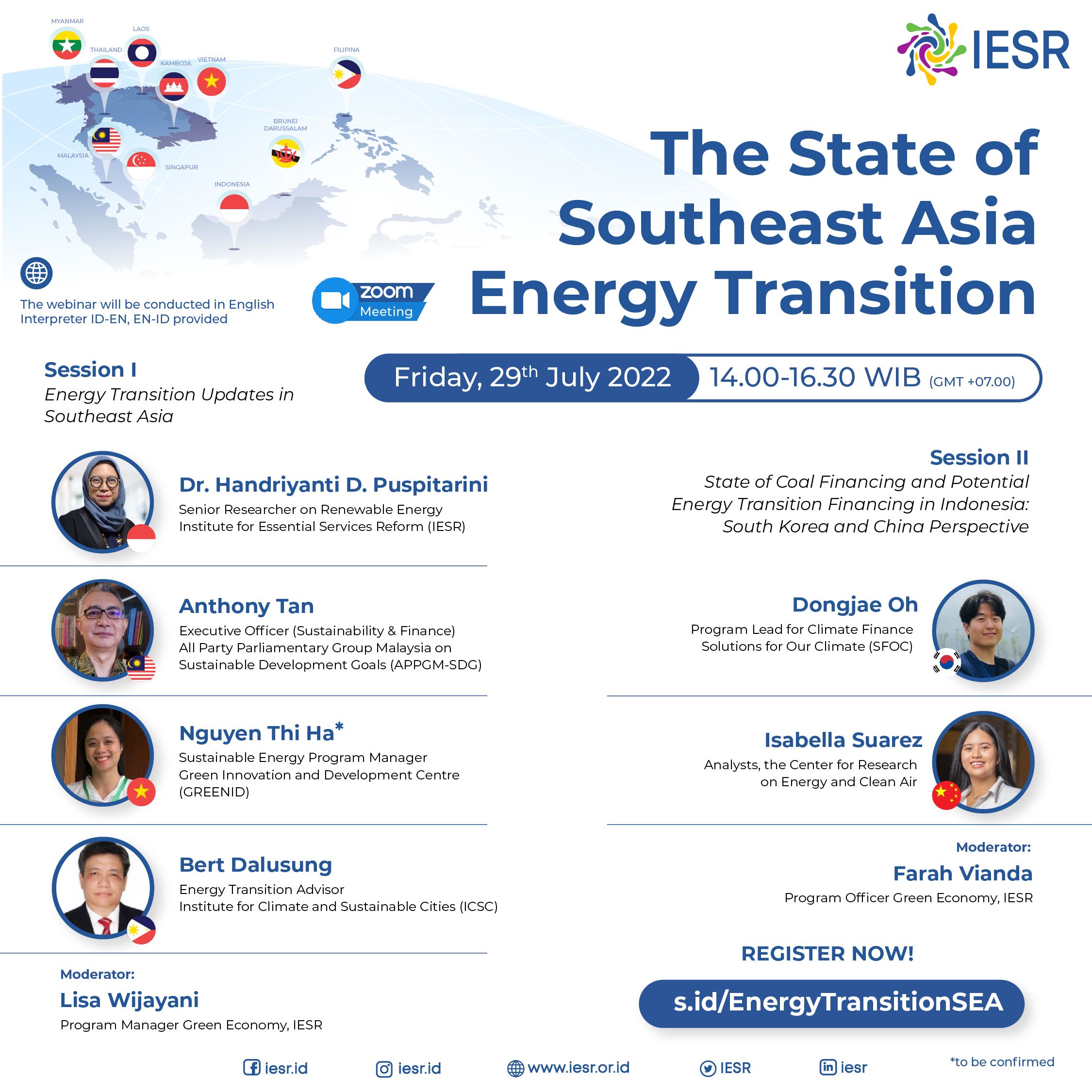
Webinar The State of Southeast Asia Energy Transition
Recording Playback
The country members of ASEAN have committed to meet a 23% target on renewable energy on energy supply by 2025. This ambition has been shown by the great achievements come from many ASEAN Member States such as Vietnam with its 11.8 giga-watts (GW) of wind power. The Philippines is not far behind and is currently developing around 3.5 GW wind farms, followed by Thailand and Indonesia with the potential of floating solar PV with capacity 2.7 GW and 145 megawatts (MW), respectively. However, the current progress is not enough as IRENA forecasted the current policy scenario is just under 17% from the 2025 target if there are no significant improvements and actions. Thus, to reach this ambition will require countries’ commitment in the region to make massive efforts in accelerating renewable power generation, shift to low-carbon energy resources, as well as increase higher financing funds and investment to deploy green technology.
IEA reported the total investment to meet the region’s climate goals by 2030 must reach USD 190 billion a year. Japan, China, and South Korea as the top East Asian countries energy investor has committed to end new coal-fired projects overseas in 2021. Greenpeace Japan study stated that Southeast Asia has potential funds around USD 205 billion to support renewable energy projects for the next 10 years. With the following of these East Asian countries’ announcement, clear ambition could open the new opportunity for the SEA to receive more funding from East Asia financial institutions in the clean energy program and halt investment in coal projects. Furthermore, Southeast Asia’s emerging green bonds market is enhance an international shift away from fossil fuel finance, both public and private. The issuance of green bonds from ASEAN+3 (ASEAN countries plus China, Japan, and South Korea) has doubled its number within a year, up to USD 30 billion in June 2021 (yoy). This growth reflects the region’s enthusiasm to allocate capital for the low-carbon economic growth.
To support the low carbon transformation process, it is imperative to strengthen cooperation among key stakeholders in the SEA countries. Achieving this goal will face different challenges across the region as some countries are more advanced in terms of infrastructure in renewable energy and financial instrument compared to other countries. Therefore, discussion among key stakeholders in the region is pertinent to address the gaps and learn from each other to scale up the clean energy transition and meet the net zero economy targets.
Materi Presentasi
Dr. Handriyanti D. Puspitarini – Institute for Essential Services Reform (IESR)
“Updates on Energy Transition in Indonesia”
IESR-2022.07.29_The-State-of-Southeast-Asia-Energy-Transition.pptx
Bert Dalusung – Energy Transition Advisor Institute for Climate and Sustainable Cities (ICSC)
“Energy Transition Update Philippines”
ICSC-presentation.pptx
Dongjae Oh – Program Lead for Climate Finance Solutions for Our Climate (SFOC)
“Updates on Energy Transition in Indonesia”
SFOC-220729_IESR_C20webinaronSEAtransition_SFOC.pptx
Isabella Suarez – Analysts the Center for Research on Energy and Clean Air (CREA)
“The Impact of ʻNo New Coalʼ Pledge on Chinaʼs Overseas Coal Investments”
CREA-China-Overseas-Coal-Presentation.pptx
Anthony Tan Kee Huat
“Energy Transition Updates – Malaysia”
APPGM-SDG-20220727-rev-Energy-Transition-Updates-Malaysia.pptx
